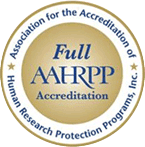Index
Congratulations to Lori Dolan and Dixie Ecklund
2018 Common Rule: Another 6-Month Delay for Compliance
Spanish Resources for the Protection of Research Participants
Deception Research: Withholding Information from Subjects
Congratulations to Lori Dolan and Dixie Ecklund
By Kelly O’Berry
The Office of the Vice President for Research and Economic Development (OVPRED) recently recognized two people affiliated with the UI Institutional Review Board (IRB) with Discovery & Innovation Awards. On behalf of the Human Subjects Office staff, IRB Chairs and members, I offer our sincere congratulations to:
Lori Dolan, 2018 Distinguished Research Professional Award
and
Dixie Ecklund, 2018 Distinguished Research Administrator Award
Lori Dolan, BSN, MA, PhD, Associate Research Scientist, Department of Orthopaedic and Rehabilitation, has been a member of IRB-01 since 2005. She is a dependable IRB member who conducts thorough and detailed reviews of applications, as a primary reviewer and as a board member. In their nomination letters, Lori’s colleagues gave examples of how she goes above and beyond her job description to manage and oversee an NIH-funded multicenter trial or to advise and encourage UI Health Care Residents and others conducting their own research. Lori is engaged in her field on the departmental, national and international levels. She has made substantive contributions to externally-funded research, scholarly publications and has received numerous external honors and awards throughout her career. Lori is one of the few non-surgeon members of the Pediatric Orthopaedic Society of North America.
Dixie Ecklund, RN, MSN, MBA, Director of Operations, Clinical Trials Statistical and Data Management Center (CTSDMC), College of Public Health, has been an IRB-01 member since 2000 and an IRB Chair since 2010. She chairs full board meetings and serves as one of the IRB-01 primary members on the IRB Executive Committee. . In their nomination letters, Dixie’s colleagues described the integral role she plays in the work of the CTSDMC to support study design, data management, project management and statistical analysis for large, multicenter clinical trials. She also serves as the Center representative on Research Council, is on the Program Committee for the Society for Clinical Trials, and teaches several UI workshops about research program management and clinical trials.
Both Lori and Dixie have made significant contributions to the University of Iowa IRB. We are fortunate to have such committed members as part of the UI research community! Please join us in congratulating Lori and Dixie for their well-deserved honors.
2018 Common Rule: Another 6-Month Delay for Compliance
The Department of Health and Human Services (HHS) recently announced another 6-month delay in the compliance date for the changes in the Federal Policy for the Protection of Human Subjects. This section of the Code of Federal Regulations (45 CFR 46) is known as the Common Rule because HHS and 16 other federal departments and agencies have all agreed to comply with this rule for all human subjects research conducted or sponsored by those agencies.
The compliance date will now be January 21, 2019. Regulated entities, like the University of Iowa, are required to continue to comply with the requirements of the pre-2018 version of the Common Rule until that date, with one exception. Institutions may choose whether to implement three burden-reducing provisions of the 2018 regulations during the delay. These include:
- The revised definition of “research,” which deems certain activities not to be research;
- The allowance for no annual continuing review of certain categories of research; and
- The elimination of the requirement that IRBs review grant applications or other funding proposals related to the research.
The Human Subjects Office and IRB are currently working on implementing the changes regarding the annual continuing review for some research. We anticipate rolling out this change in late summer, before the beginning of fall semester. At that time we will provide information to the research community about how this change will be implemented into standard operating procedures and what research studies will be affected. The HSO and IRB leadership are evaluating how to proceed with the other two optional burden-reducing initiatives. Additional information will be provided as it becomes available.
Information about the history of the revisions to this rule is available in the recent HHS press release.
Spanish Resources for the Protection of Research Participants
By Kelly O’Berry
The Office of Human Research Protections (OHRP) recently announced the expansion of resources on their public outreach site, About Research Participation, to include Spanish language materials. Each sub-page of this website includes the option to view in English or in Spanish.
The website includes the following sections:
- Informational videos about participating in a research study
- What is research?
- What is a clinical trial
- Questions to ask the research team to decide whether to participate
- An explanation of randomization
- A printable version of the questions for potential subjects to ask the research team to make an informed decision about whether to participate in the research
- About research
- What happens when you participate in research
- About research risks
- About privacy and confidentiality
- Financial considerations
- Additional considerations – the personal and practical aspects of participating in research
- A series of infographics about the federal regulations for the protection of human subjects – answering questions like,
- Why do we have regulations to protect research participants?
- What are the principal regulations that protect research participants?
- Which federal office oversees and enforces the regulations?
- Is there research that is not regulated by the Common Rule?
- Protecting human subjects is a shared responsibility.
- Additional resources
- Glossary of terms
- Links to federal resources
- Media and other resources
OHRP intends for these resources to be used by the research community as well as the general public. Study investigators, coordinators and research team members are encouraged to use these materials to facilitate and improve the informed consent process for potential subjects who are English- and Spanish-speaking.
Deception Research: Withholding Information from Subjects
By Patricia Katopol, PhD
Ethical research generally requires that subjects have complete and truthful information about the study design and procedures before they enroll in a study. This information is typically presented in the written Informed Consent Document and may be presented verbally during the consent process. However, there are circumstances in which providing complete information before participation might affect how subjects participate in research. When information is withheld from subjects it is called “deception.”

The Belmont Report states, “In most cases of research involving human subjects, respect for persons demands that subjects enter into the research voluntarily and with adequate information.” The Code of Federal Regulations for the Protection of Human Subjects at 45 CFR 46.116(a) includes a complete list of the elements of consent that should be present in an Informed Consent Document; all of the elements of consent are considered necessary for voluntary participation in research. One of the elements of consent that is particularly relevant to deception research is that the consent should provide an “explanation of the purpose of the research.” (45 CFR 46.116(a)(1)) However, under certain circumstances and with proper justification, the IRB can waive one or more of the required elements of consent. When a researcher withholds information about the purpose of the study or any other information about the study design or procedures, it is called deception research.
Deception in research occurs when the subject is not provided with ‘pertinent’ information about the study – information that would affect the subject’s decision to participate. The use of deception is more common in social and behavioral science research as it can only be done in minimal risk research. For example, research on library services frequently includes posing as a patron asking questions at the reference desk.
Waiver of Elements of Consent
It is expected that informed consent provides an explanation of the purpose of the research, a description of procedures, and a description of reasonably foreseeable risks to the subject. Under 45 CFR 46.116(d), the IRB may waive of some elements of consent if:
- The research involves no more than minimal risk to the subjects;
- The waiver or alteration will not adversely affect the rights and welfare of the subjects;
- The research could not practicably be carried out without the waiver or alteration; and
- Where appropriate, subjects will be provided with additional pertinent information after participation.
Previously, the FDA did not permit waivers or alternations of the elements of consent listed in 21.CFR 50.25. In an effort to bring FDA procedures in line with the proposed changes of the Revised Common Rule, a 2017 guidance document suggests that the IRB may grant waivers or alternation of the informed consent for minimal risk studies.
The VA has consent requirements that are similar to 45 CFR 46.116, with the addition of permitting a waiver or alteration of some elements of consent for public benefit or service programs.
Debriefing
Perhaps the most important aspect of reducing risk in research involving deception is debriefing, providing subjects with additional pertinent information after participation. The UI IRB requires debriefing as soon as possible after the conclusion of the experiment. Debriefing may be oral or provided as a written handout for subjects. Since the statements are very study-specific, the UI IRB does not provide a template debriefing statement, but there are some sample statements on line, such as these from Harvard University and the University of Virginia. Whether using a template or writing their own statement, the investigator must describe the debriefing process in the HawkIRB application and attach the script or written statement as a miscellaneous attachment.
The debriefing statement should be written at a level that is understandable by subjects and should include how the study’s true purpose, why deception was necessary, and a reminder that participation was voluntary and that subject may still withdraw from study. If compensated, the subject should be told that s/he will still receive compensation even if they withdraw from the study after completion.
Debriefing should occur as close to the end of the subject’s participation as possible. However, in some cases debriefing may have to wait until the end of the project, especially if there is a possibility that subjects will tell other members of the population about the true nature of the study. For example, students may be asked not to talk to classmates who will also be subjects so as not to skew the study results. Qualitative researchers, who often build a relationship with their participants, may want to include an apology for the deception in their debriefing. In other situations, debriefing may include feedback for student subjects that includes information that contributes to their education on the topic. Finally, it should be noted that UI IRB guidelines state that the individual conducting the debriefing should not be in a position of authority over the participant.
Completing the Application in HawkIRB
Researchers may request a waiver of one or more elements of consent in Section IV.3 (“Are you requesting a waiver of informed consent/authorization (subjects will not be given any oral or written information about the study)?”). The responses to Section IV.3-IV.19 must provide adequate justification for the IRB to grant a waiver of an element of consent.
For deception studies, investigators should choose the answer “Yes, but only for some of the subjects.” The response to Section IV.6 (“Will subjects be provided with additional pertinent information after participation?”) should be ‘Yes’. Note that “pertinent information” is that which was withheld from subjects because they were not provided with all of the elements of consent. Answering ‘yes’ to Section IV.6 opens Section IV.7. Here, the investigator can describe the information provided to subjects after the study or note that a debriefing statement is attached. Finally, a full description of the debriefing process should be in Section VII.E.6.
Researchers should keep in mind that some subjects may be more affected by deception than others. If subjects become upset or agitated during the study, they may need to talk to someone about their experience afterward; others may want to leave the study. Information about available assistance should be stated in Section IV.7 of HawkIRB. Section VIII.2 (“What have you done to minimize the risks?”) should state, where applicable, whether the PI will provide a therapist or counselor, that subjects may withdraw from the study after debriefing, and that the PI will destroy the subject’s data upon their request.
Conclusion
Withholding some information from research participants may be permitted if the IRB grants a waiver of some of the elements of consent. The study should not be feasible without the waiver and, if appropriate, subjects should be given complete information about the study after their participation or when the research is concluded. Investigators cannot adversely affect the rights and welfare of the subjects by the use of deception. In addition, investigators should remember that all studies pose some risk to subjects. Withholding information during the consent process may seem innocuous to members of the research team, but may cause distress to subjects. It is important to plan in advance how the study will support subjects so that they know they have an opportunity to discuss their emotions or withdraw from the study after receiving the information that was withheld at the time of consent.
IRB Advisor, June 2018: Blood Samples From Newborns - Suit Alleges State of Michigan Lacked Informed Consent


By Brent Collinsworth
Philip L. Ellison, a practicing attorney in Michigan, never thought of himself as a crusader for the rights of human subjects in research. Once his newborn was admitted to the neonatal ICU, however, he found himself in an ethical problem. When his son was admitted shortly after birth to resolve a blood sugar issue, the doctors gave Ellison an informed consent form asking to use the blood samples they had already collected from his child. He believed that he was approached while his child was in a moment of crisis was unethical, and how the samples were already taken without consent was a breach of his Fourth Amendment rights. Ellison is now suing for his family in a case against the state of Michigan, and is representing himself and the parents of nine other newborns in federal court.
However, while Mr. Ellison argues that the actions of the state and federal government constitute a breach of Fourth Amendment rights, many in the public health field argue that they are necessary. Lynn Sutfin, the public information officer for the Michigan Department of Health and Human Services, provided information about these blood draws to IRB Advisor. She stated that the blood is drawn for the state-mandated newborn screening program, where the newborn is tested for 54 disorders to detect rare diseases that require immediate intervention. This may done without parental consent, yes, but the participation in the medical research must be done with parental consent. What’s more, she states, the blood samples are stored in a de-identified manner.
The IRB Advisor editor interviewed Ellison about his position, his case, and how far he is willing to go.
Other articles in the May issue of IRB Advisor include:
- “All of Us: NIH Looks to the Future, Tries to Overcome the Past”
- “With Common Rule Delay, IRBs Can Still Revamp Human Research Protection Programs”
- “IRB’s New Online Learning System Teaches Student PIs About Submissions”
- “Quality Assurance Project Designed to Improve Good Clinical Practice and Compliance”
- “FDA Moves to Shutter Stem Cell Clinics”
Current and Past Issues
IRB Advisor (a publication of Relias) is a monthly newsletter with articles about issues facing IRBs and individuals involved with human subjects research. The University of Iowa subscribes to this publication as a resource to UI faculty, staff and student researchers as well as for IRB members and Human Subjects Office staff.
Current and past issues of IRB Advisor are posted in the “IRB ICON Course for Researchers” which is accessible to anyone with a UI HawkID and password. You must access this ICON Course from the Education and Training page of the Human Subjects Office web site. Due to our licensing agreement, we are no longer able to post a link to this publication on the Human Subjects Office website.




